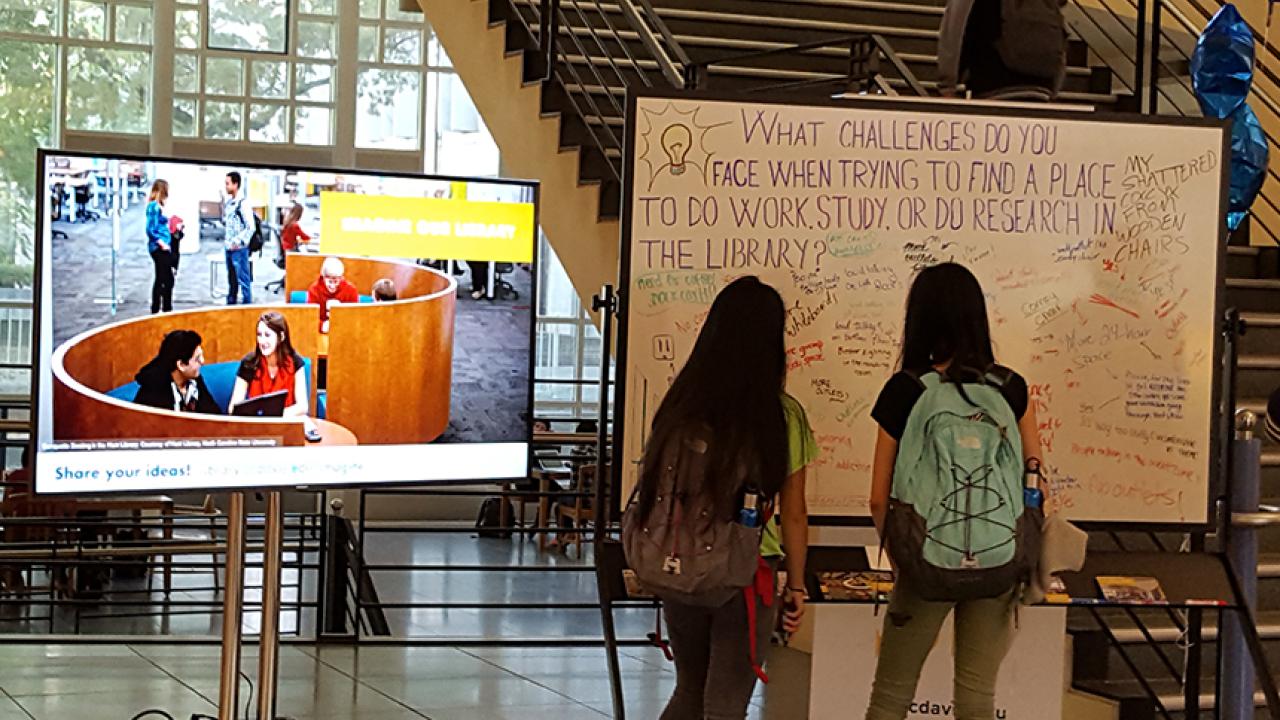How to Participate
Attend one of the four workshops or take this survey to share your ideas about the future of the UC Davis Library.
• The Library as a Place for Individual and Small-Group Study and Research — 3:30-6 p.m. Monday, Oct 24
• The Library as a Partner in Research and Scholarship — 10:30 a.m.-1 p.m. Tuesday, Oct 25
* The Library as a Place for Collaboration — 3:30-6 p.m. Wednesday, Oct. 26
• The Library as Academic Hub — 9-11:30 a.m. Thursday, Oct. 27
All workshops will be in first-floor conference room, Shields Library. Space is limited to 20 people per session, so advance registration is recommended. The online survey is available for people unable to attend.
The visioning process for the UC Davis Library of the 21st century is moving full-steam ahead this fall with workshops later this month and an online survey that build on research conducted spring quarter. The earlier research assessed how our library buildings are used today and identified opportunities for improvement. The upcoming workshops will look ahead — introducing new ideas, brainstorming solutions and inviting the community’s response to possibilities for the future.
The visioning process is designed to guide future renovations, enabling the UC Davis Library to continue providing the necessary spaces, technologies and services to meet the needs of the campus community.
“The UC Davis Library has always been a world-class library in the print era, and we are committed to ensuring we remain a world-class library in the 21st century,” University Librarian MacKenzie Smith said. “But doing so will require creative rethinking of what our library can be.”
Share your ideas
To ensure that the library’s vision for the future is inclusive of the needs of the entire campus community, the library is inviting students, faculty and researchers to share their perspectives on what they need in order to succeed in their studies, teaching and research.
Four workshops will be held during the last week of October, each focused on a different theme:
- The library as a place for individual and small-group study and research
- The library as a partner in research and scholarship
- The library as a place for collaboration
- The library as academic hub
Midpoint research insights
The visioning process began during spring quarter with a series of focus groups, interviews and other outreach focused on gauging people’s reactions to existing work and study spaces in libraries and other campus locations, including the Memorial Union, Student Community Center, Silo, Quad and arboretum.
Here’s some of what people liked:
- Convenient location
- Access to food and coffee
- Connection between indoor and outdoor environments
- Natural light
- Variety of seating options for both individual and group work
- “Crossroads” location, where you can see a diverse cross-section of the campus community
- Amenities that support productivity, from electrical outlets to meeting rooms with whiteboards
The outreach also produced these findings about the Shields, Carlson Health Sciences, and Physical Sciences and Engineering library buildings:
- The number of visitors has increased over the past five years, consistent with overall enrollment growth.
- Certain spaces within our library buildings, such as grad student “cages” and faculty carrels, are rarely used.
- Students appreciate the variety of work spaces available, but are looking for greater diversity in seating and ambient noise. In particular, completely silent spaces are hard to find.
- Library users said they’d like to see more electrical outlets, better lighting, more comfortable furniture and air temperatures, and meeting spaces with display technology — to create more productive work spaces.
Beyond physical spaces themselves, users valued librarians for their subject expertise and institutional knowledge, which are offered through a variety of means, ranging from individual consultation to in-class teaching.
Change whose time has come
Although the library, in some fashion, touches nearly every student, faculty member and researcher during their time at UC Davis, none of the library buildings (except those for the law and medical schools) has been renovated for a quarter of a century. Meanwhile, digital technology, data science and cloud services have transformed how people interact with information and with one another.
These changes, Smith pointed out, demand an evolution in how the UC Davis Library serves the campus as:
- A physical and virtual space that provides access to information
- A universally accessible place for study, work and collaboration that cuts across the university’s traditional divides
- The home of academic tools and resources shared by the entire campus community
- The home of the university’s experts in how to find, manage and interpret information — from teaching information research skills to undergraduates, to helping researchers manage and analyze their data efficiently. More about data management and data analysis.
A comprehensive vision for the future of library space, which takes into account each of these roles, will be completed by early 2017.
Learn more about the library’s visioning and space planning process, and share your ideas: library.ucdavis.edu/imagine.
Media Resources
Jessica Nusbaum, 530-752-4145, jlnusbaum@ucdavis.edu
